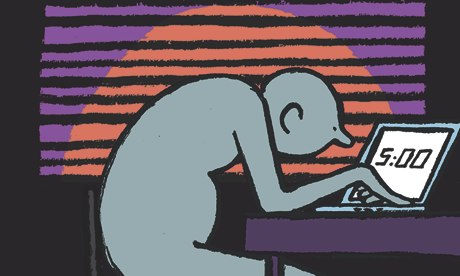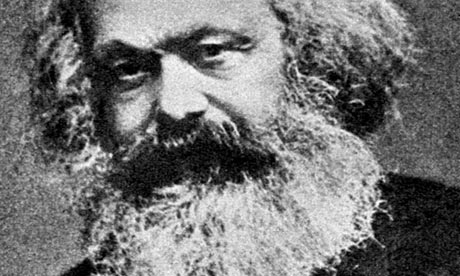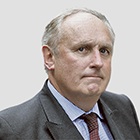Benjamin Franklin spent his mornings naked. Patricia Highsmith ate only bacon and eggs. Marcel Proust breakfasted on opium and croissants. The path to greatness is paved with a thousand tiny rituals (and a fair bit of substance abuse) – but six key rules emerge
One morning this summer, I got up at first light – I'd left the blinds open the night before – then drank a strong cup of coffee, sat near-naked by an open window for an hour, worked all morning, then had a martini with lunch. I took a long afternoon walk, and for the rest of the week experimented with never working for more than three hours at a stretch.
This was all in an effort to adopt the rituals of some great artists and thinkers: the rising-at-dawn bit came from Ernest Hemingway, who was up at around 5.30am, even if he'd been drinking the night before; the strong coffee was borrowed from Beethoven, who personally counted out the 60 beans his morning cup required.Benjamin Franklin swore by "air baths", which was his term for sitting around naked in the morning, whatever the weather. And the midday cocktail was a favourite of VS Pritchett (among many others). I couldn't try every trick I discovered in a new book, Daily Rituals: How Great Minds Make Time, Find Inspiration And Get To Work; oddly, my girlfriend was unwilling to play the role of Freud's wife, who put toothpaste on his toothbrush each day to save him time. Still, I learned a lot. For example: did you know that lunchtime martinis aren't conducive to productivity?
As a writer working from home, of course, I have an unusual degree of control over my schedule – not everyone could run such an experiment. But for anyone who thinks of their work as creative, or who pursues creative projects in their spare time, reading about the habits of the successful, can be addictive. Partly, that's because it's comforting to learn that even Franz Kafkastruggled with the demands of his day job, or that Franklin was chronically disorganised. But it's also because of a covert thought that sounds delusionally arrogant if expressed out loud: just maybe, if I took very hot baths like Flaubert, or amphetamines like Auden, I might inch closer to their genius.
Several weeks later, I'm no longer taking "air baths", while the lunchtime martini didn't last more than a day (I mean, come on). But I'm still rising early and, when time allows, taking long walks. Two big insights have emerged. One is how ill-suited the nine-to-five routine is to most desk-based jobs involving mental focus; it turns out I get far more done when I start earlier, end a little later, and don't even pretend to do brain work for several hours in the middle. The other is the importance of momentum. When I get straight down to something really important early in the morning, before checking email, before interruptions from others, it beneficially alters the feel of the whole day: once interruptions do arise, they're never quite so problematic. Another technique I couldn't manage without comes from the writer and consultant Tony Schwartz: use a timer to work in 90-minute "sprints", interspersed with signficant breaks. (Thanks to this, I'm far better than I used to be at separating work from faffing around, rather than spending half the day flailing around in a mixture of the two.)
The one true lesson of the book, says its author, Mason Currey, is that "there's no one way to get things done". For every Joyce Carol Oates, industriously plugging away from 8am to 1pm and again from 4pm to 7pm, or Anthony Trollope, timing himself typing 250 words per quarter-hour, there's a Sylvia Plath, unable to stick to a schedule. (Or a Friedrich Schiller, who could only write in the presence of the smell of rotting apples.) Still, some patterns do emerge. Here, then, are six lessons from history's most creative minds.
1. Be a morning person
 Georgia O'Keeffe: one of a majority of very early morning risers. Photograph: AP
Georgia O'Keeffe: one of a majority of very early morning risers. Photograph: AP
It's not that there aren't successful night owls: Marcel Proust, for one, rose sometime between 3pm and 6pm, immediately smoked opium powders to relieve his asthma, then rang for his coffee and croissant. But very early risers form a clear majority, including everyone from Mozart to Georgia O'Keeffe to Frank Lloyd Wright. (The 18th-century theologian Jonathan Edwards, Currey tells us, went so far as to argue that Jesus had endorsed early rising "by his rising from the grave very early".) For some, waking at 5am or 6am is a necessity, the only way to combine their writing or painting with the demands of a job, raising children, or both. For others, it's a way to avoid interruption: at that hour, as Hemingway wrote, "There is no one to disturb you and it is cool or cold and you come to your work and warm as you write." There's another, surprising argument in favour of rising early, which might persuade sceptics: that early-morning drowsiness might actually be helpful. At one point in his career, the novelist Nicholson Baker took to getting up at 4.30am, and he liked what it did to his brain: "The mind is newly cleansed, but it's also befuddled… I found that I wrote differently then."
Psychologists categorise people by what they call, rather charmingly, "morningness" and "eveningness", but it's not clear that either is objectively superior. There is evidence that morning people are happier and more conscientious, but also that night owls might be more intelligent. If you're determined to join the ranks of the early risers, the crucial trick is to start getting up at the same time daily, but to go to bed only when you're truly tired. You might sacrifice a day or two to exhaustion, but you'll adjust to your new schedule more rapidly.
2. Don't give up the day job
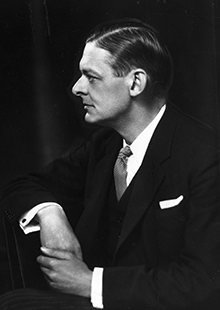 TS Eliot’s day job at Lloyds bank gave him crucial financial security. Photograph: Hulton Archive/Getty Images
TS Eliot’s day job at Lloyds bank gave him crucial financial security. Photograph: Hulton Archive/Getty Images
"Time is short, my strength is limited, the office is a horror, the apartment is noisy," Franz Kafka complained to his fiancee, "and if a pleasant, straightforward life is not possible, then one must try to wriggle through by subtle manoeuvres." He crammed in his writing between 10.30pm and the small hours of the morning. But in truth, a "pleasant, straightforward life" might not have been preferable, artistically speaking: Kafka, who worked in an insurance office, was one of many artists who have thrived on fitting creative activities around the edges of a busy life. William Faulkner wrote As I Lay Dying in the afternoons, before commencing his night shift at a power plant; TS Eliot's day job at Lloyds bank gave him crucial financial security; William Carlos Williams, a paediatrician, scribbled poetry on the backs of his prescription pads. Limited time focuses the mind, and the self-discipline required to show up for a job seeps back into the processes of art. "I find that having a job is one of the best things in the world that could happen to me," wroteWallace Stevens, an insurance executive and poet. "It introduces discipline and regularity into one's life." Indeed, one obvious explanation for the alcoholism that pervades the lives of full-time authors is that it's impossible to focus on writing for more than a few hours a day, and, well, you've got to make those other hours pass somehow.
3. Take lots of walks
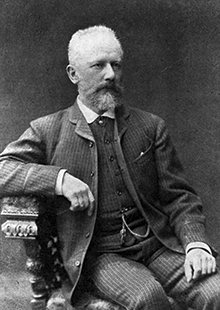 Tchaikovsky 'believed he had to take a walk of exactly two hours a day and that if he returned even a few minutes early, great misfortunes would befall him.' Photograph: Hulton Archive/Getty Images
Tchaikovsky 'believed he had to take a walk of exactly two hours a day and that if he returned even a few minutes early, great misfortunes would befall him.' Photograph: Hulton Archive/Getty Images
There's no shortage of evidence to suggest that walking – especially walking in natural settings, or just lingering amid greenery, even if you don't actually walk much – is associated with increased productivity and proficiency at creative tasks. But Currey was surprised, in researching his book, by the sheer ubiquity of walking, especially in the daily routines of composers, including Beethoven, Mahler, Erik Satie and Tchaikovksy, "who believed he had to take a walk of exactly two hours a day and that if he returned even a few minutes early, great misfortunes would befall him". It's long been observed that doing almost anything other than sitting at a desk can be the best route to novel insights. These days, there's surely an additional factor at play: when you're on a walk, you're physically removed from many of the sources of distraction – televisions, computer screens – that might otherwise interfere with deep thought.
4. Stick to a schedule
 Patricia Highsmith, among others, ate virtually the same thing for every meal, in her case bacon and fried eggs. Photograph: Corbis Sygma
Patricia Highsmith, among others, ate virtually the same thing for every meal, in her case bacon and fried eggs. Photograph: Corbis Sygma
There's not much in common, ritual-wise, between Gustave Flaubert – who woke at 10am daily and then hammered on his ceiling to summon his mother to come and sit on his bed for a chat – and Le Corbusier, up at 6am for his 45 minutes of daily calisthenics. But they each did what they did with iron regularity. "Decide what you want or ought to do with the day," Auden advised, "then always do it at exactly the same moment every day, and passion will give you no trouble." (According to legend, Immanuel Kant's neighbours in Königsberg could set their clocks by his 3.30pm walk.) This kind of existence sounds as if it might require intimidating levels of self-discipline, but on closer inspection it often seems to be a kind of safety net: the alternative to a rigid structure is either no artistic creations, for those with day jobs, or the existential terror of no structure at all.
It was William James, the progenitor of modern psychology, who best articulated the mechanism by which a strict routine might help unleash the imagination. Only by rendering many aspects of daily life automatic and habitual, he argued, could we "free our minds to advance to really interesting fields of action". (James fought a lifelong struggle to inculcate such habits in himself.) Subsequent findings about "cognitive bandwidth" and the limitations of willpower have largely substantiated James's hunch: if you waste resources trying to decide when or where to work, you'll impede your capacity to do the work. Don't consider afresh each morning whether to work on your novel for 45 minutes before the day begins; once you've resolved that that's just what you do, it'll be far more likely to happen. It might have been a similar desire to pare down unnecessary decisions that led Patricia Highsmith, among others, to eat virtually the same thing for every meal, in her case bacon and fried eggs. Although Highsmith also collected live snails and, in later life, promulgated anti-Semitic conspiracy theories, so who knows?
5. Practise strategic substance abuse
 Ayn Rand took Benzedrine. Photograph: New York Times Co/Getty Images
Ayn Rand took Benzedrine. Photograph: New York Times Co/Getty Images
Almost every potential chemical aid to creativity has been tried at some time or another: Auden, Ayn Rand and Graham Greene had their Benzedrine, the mathematician Paul Erdös had his Ritalin (and his Benzedrine); countless others tried vodka, whisky or gin. But there's only one that has been championed near-universally down the centuries: coffee. Beethoven measured out his beans, Kierkegaard poured black coffee over a cup full of sugar, then gulped down the resulting concoction, which had the consistency of mud; Balzac drank 50 cups a day. It's been suggested that the benefits of caffeine, in terms of heightened focus, might be offset by a decrease in proficiency at more imaginative tasks. But if that's true, it's a lesson creative types have been ignoring for ever. Consume in moderation, though: Balzac died of heart failure at 51.
6. Learn to work anywhere
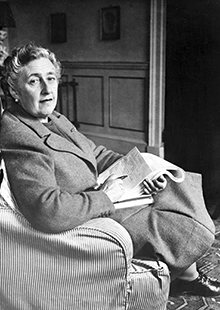 Agatha Christie didn’t have a desk. Any stable tabletop for her typewriter would do. Photograph: AFP/Getty Images
Agatha Christie didn’t have a desk. Any stable tabletop for her typewriter would do. Photograph: AFP/Getty Images
One of the most dangerous procrastination-enabling beliefs is the idea that you must find exactly the right environment before you can get down to work. "For years, I said if only I could find a comfortable chair, I would rival Mozart," the American composer Morton Feldman recalled. Somerset Maugham had to face a blank wall before the words would come (any other view, he felt, was too distracting). But the stern message that emerges from many other artists' and authors' experiences is: get over yourself. During Jane Austen's most productive years, at Chawton in Hampshire in the 1810s, she wrote mainly in the family sitting-room, often with her mother sewing nearby. Continually interrupted by visitors, she wrote on scraps of paper that could easily be hidden away. Agatha Christie, Currey writes, had "endless trouble with journalists, who inevitably wanted to photograph the author at her desk": a problematic request, because she didn't have one. Any stable tabletop for her typewriter would do.
In any case, absolute freedom from distraction may not be as advantageous as it sounds. One study recently suggested that some noise, such as the background buzz of a coffee shop, may be preferable to silence, in terms of creativity; moreover, physical mess may be as beneficial for some people as an impeccably tidy workspace is for others. The journalistRon Rosenbaum cherishes a personal theory of "competing concentration": working with the television on, he says, gives him a background distraction to focus against, keeping his attentional muscles flexed and strong.
But there is a broader lesson here. The perfect workspace isn't what leads to brilliant work, just as no other "perfect" routine or ritual will turn you into an artistic genius. Flaubert didn't achieve what he did because of hot baths, but through immeasurable talent and extremely hard work. Which is unfortunate, because I'm really good at running baths.
Benzedrine, naps, an early night: an extract from Daily Rituals
Gertrude Stein
In Everybody's Autobiography, Stein confirmed that she had never been able to write for much more than half an hour a day, but added, "If you write a half-hour a day, it makes a lot of writing year by year." Stein and her lifelong partner, Alice B Toklas, had lunch at about noon and ate an early, light supper. Toklas went to bed early, but Stein liked to stay up arguing and gossiping with visiting friends. After her guests finally left, Stein would wake Toklas, and they would talk over the day before both going to sleep.
Ludwig van Beethoven
Beethoven rose at dawn and wasted little time getting down to work. His breakfast was coffee, which he prepared himself with great care: 60 beans per cup. After his midday meal, he embarked on a long walk, which would occupy much of the rest of the afternoon. As the day wound down, he might stop at a tavern to read the newspapers. Evenings were often spent with company or at the theatre, although in winter he preferred to stay at home and read. He retired early, going to bed at 10pm at the latest.
WH Auden
"Routine, in an intelligent man, is a sign of ambition," Auden wrote in 1958. If that's true, the poet was one of the most ambitious men of his generation. He rose shortly after 6am, made coffee and settled down to work quickly, perhaps after taking a first pass at the crossword. He usually resumed after lunch and continued into the late afternoon. Cocktail hour began at 6.30pm sharp, featuring several strong vodka martinis. Then dinner was served, with copious amounts of wine. To maintain his energy and concentration, he relied on amphetamines, taking Benzedrine each morning. At night, he used Seconal or another sedative to get to sleep.
Sylvia Plath
Plath's journal, which she kept from age 11 until her suicide at 30, records a near-constant struggle to find and stick to a productive writing schedule. Only near the end of her life, separated from her husband, Ted Hughes, and taking care of their two small children alone, did she find a routine that worked for her. She was using sedatives to get to sleep, and when they wore off at about 5am, she would get up and write until the children awoke. Working like this for two months in 1962, she produced nearly all the poems of Ariel.
Alice Munro
In the 1950s, as a young mother taking care of two small children, Munro wrote in the slivers of time between housekeeping and child-rearing. When neighbours dropped in, Munro didn't feel comfortable telling them she was trying to work. She tried renting an office, but the garrulous landlord interrupted her and she hardly got any writing done. It ultimately took her almost two decades to put together the material for her first collection, Dance Of The Happy Shades.
David Foster Wallace
"I usually go in shifts of three or four hours with either naps or fairly diverting do-something-with-other-people things in the middle," Wallace said in 1996, shortly after the publication of Infinite Jest. "So I'll get up at 11 or noon, work till two or three." Later, however, he said he followed a regular writing routine only when the work was going badly. "Once it starts to go, it requires no effort. And then actually the discipline's required in terms of being willing to be away from it and to remember, 'Oh, I have a relationship that I have to nurture, or I have to grocery-shop or pay these bills.' "
Ingmar Bergman
"Do you know what moviemaking is?" Bergman asked in a 1964 interview. "Eight hours of hard work each day to get three minutes of film." But it was also writing scripts, which he did on the remote island of Fårö, Sweden. He followed the same schedule for decades: up at 8am, writing from 9am until noon, then an austere meal. "He eats the same lunch," actorBibi Andersson remembered. "It's some kind of whipped sour milk and strawberry jam – a strange kind of baby food he eats with corn flakes." After lunch, Bergman worked from 1pm to 3pm, then slept for an hour. In the late afternoon he went for a walk or took the ferry to a neighbouring island to pick up the newspapers and the mail. In the evening he read, saw friends, screened a movie, or watched TV (he was particularly fond of Dallas). "I never use drugs or alcohol," Bergman said. "The most I drink is a glass of wine and that makes me incredibly happy."

